A Note on Primary Elections
Data from Texas underscore a frequent point about primaries.
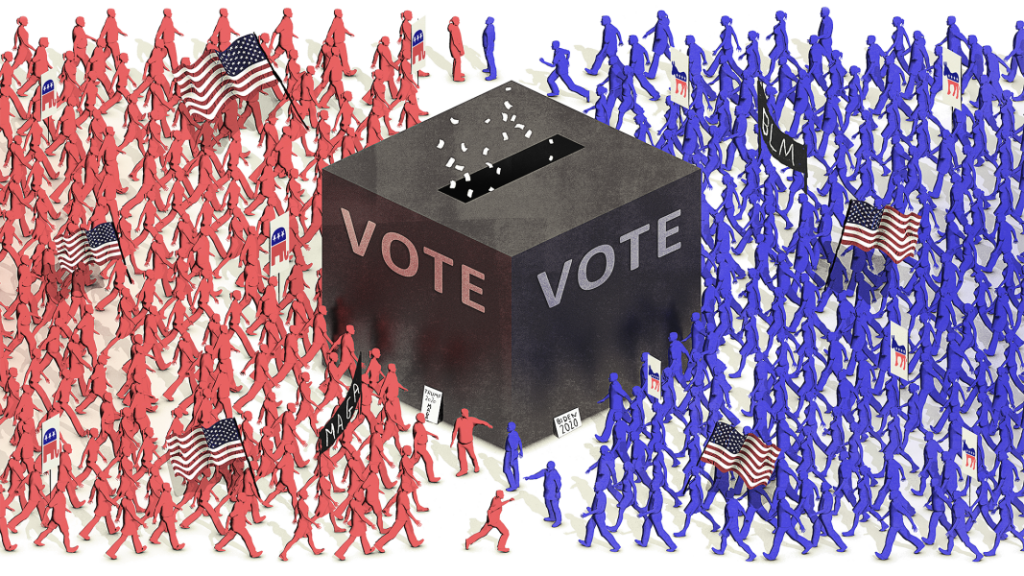
I frequently note that turnout in primary elections is quite low and a piece from the Texas Tribune (Voter turnout in Texas primaries is dramatically low. New political maps and voting law could create more obstacles.) provides some clear data on this point.
Note the following:

While I would expect the 2022 numbers to certainly increase, even if they hit the 2018 levels (the prior midterm) or even the 2020 levels, how anemic is that when one considers that the very shape of the parties is dictated by these contests?
As the piece rightly notes:
Primary voters tend to be more engaged in politics compared with the rest of the electorate, whether that involves news consumption or engagement with civic organizations, according to Blank.
Republican primary voters skew white and more conservative than the overall party, and Democratic primary voters skew whiter, more liberal and more suburban than the overall party, Blank added.
Not only do primaries produce the candidates that shape the party, they very frequently are the real elections. By this, I mean that the very nature of single-seat districts means that in most contests the partisan makeup of the district means that the general election is a foregone conclusion (due to geographic sorting and other factors all as enhanced by gerrymandering). So, the reality is that instead of a member of local, state, or federal government being chosen by majority vote in a district (although turnout there stinks as well), the reality is that the eventual winner gets into office because of the preferences of potentially single-digit support in the district. What sounds like a democratic process (let the people pick the candidates!) is really substantial empowerment of a relatively small number of voters. This structure also increases the odds of fringe candidates like Marjorie Taylor Greene being elected
To this point, the Tribune piece notes:
Texas lawmakers redrew maps for the state House and Senate, congressional delegation and State Board of Education, locking in GOP power for the next decade. The maps dilute the voting powers of Texans of color — even though new census data shows people of color are driving population growth.
Redistricting is expected to result in less competitive races between Republicans and Democrats in November. New maps have resulted in more uncontested primary races, meaning only one major political party has a candidate.
In roughly one-third of all political seats up for election in Texas this year, primaries are the only election because the one major party didn’t field a candidate. Out of 150 Texas House seats, there are no Democratic candidates for 41 seats and no Republican candidates for 27 seats. In the 31-seat Texas Senate, eight seats do not have Democratic candidates and three do not have Republican candidates. For the U.S. House, there are no Democratic candidates in six out of 38 seats.
Emphasis mine.
I will, as I often do: if competition is good for business and sports teams (i.e., that it makes them better), why do we tolerate increasingly uncompetitive elections?
Is this really democracy?

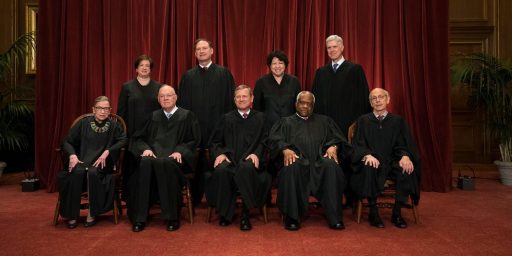
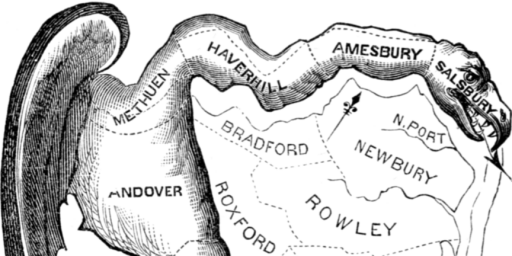
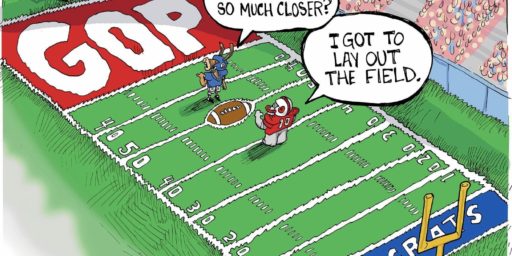
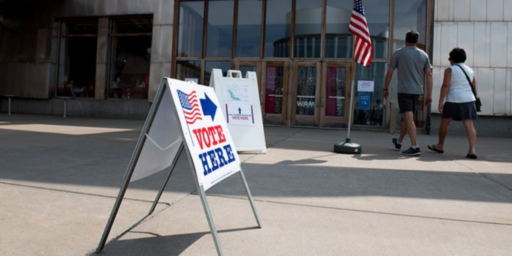
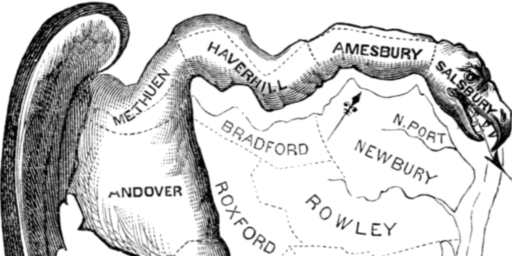
No, but it may be a reflection of the determination of the people (and indirectly[??] the political parties) to keep the republic they’ve got. Nations get the government they deserve, and all that.
why do we tolerate increasingly uncompetitive elections?
Vell, Mein Herr, just do you vant the peons to do? Make dem actually vote? Use guns iff you haff to? Das is gut alt-fashioned Democrat party vay? Ya?
@Just nutha ignint cracker:
Here’s my campaign for Supreme Potato/Potentate:
I figure that’ll get me maybe 3 votes.
@John430:
IIRC, the idea behind a representative form of government is that EVERYONE’s vote in a given race matters. Not just the folks who look or think like John (or Luddite, for that matter) do.
I’m not sure there’s a choice. Increasingly, the base on both sides believes the other side is committed to achieving single-party rule, forever. Those bases are no longer listening to policies, or ideas. It’s simply vote for my side, because if the other side gets control, my side will be effectively locked out. If one base is enough bigger than the other in a state/district/city, the outcome is preordained.
There are still a few places (and times) when ideas can sway things. My own belief about what happened in Virginia is (a) it was an odd-year election, so poor turnout, and (b) there were a bunch of people motivated by the idea, “the (D)s didn’t open the schools and that’s ruining my life.”
@Michael Cain:
Except one side seems to have a point based on reality, and the other is making up wild bullshit after snorting too much horse paste.
One side wants to make sure everyone is able to exercise their right to vote, while the other side is perfectly fine with cutting polling places and opportunities to create 8 hour lines.
The obvious, simple, and fair solution (meaning it will never happen) would be to make the primaries the actual election.
@Flat Earth Luddite: Hey! Give John 430 credit. He’s one of the few trolls that shows up for work anymore. He’s not thoughtful or clever. He’s certainly not intelligent or creative, but he keeps pitching. Mostly over the batter’s head or in the dirt, but he stands on the mound throwing sh!t. That’s gotta count for something. Not much, I’ll grant you, but something.
@Kathy: You actually want the office holder to be the guy who got 14% from among 7 candidates with 12% of the electorate voting? Really?
I have no idea what made me think of this?!?!?
…that’s very Democratic. Also Republican...
@Gustopher:
That, and, as always, projection.
@Gustopher:
You don’t have to convince me, I’m on the (D) side. OTOH, I will point out that my side endorses the National Popular Vote, the goal of which is to fundamentally change how Presidents are elected w/o the (essentially impossible) step of amending the Constitution. People I know on the conservative side are terrified at the prospect of a (D) lock on the presidency.
@John430: Let me ask a simple question, and I would love to hear your answer: if a district is drawn purposefully to contain 75% Democrats and 25% Republicans, what do you anticipate to be the results of a given election? Follow-up question: Is this a competitive election?
@Just nutha ignint cracker:
No, but isn’t that what you get now?
It does make you wonder if in a highly uncompetitive district (lets say it favors R), a D could run in the R primary, a bunch of D voters switch, and steal the seat while the R voters fight over their favorites.
Here in SC, you don’t register for a party as a voter, so can choose to vote in either primary.
@BugManDan: In theory, yes. For example, that is how Ron Paul, after having run as the Libertarian Party’s candidate for president, won a seat in the Congress running as an R (which he had run as before and won, I would note).
There is a definite porousness to the process. Still, pulling off what you describe would be awfully difficult for a variety of reasons.
@BugManDan: And every election season, there’s grumbling among the SC GOP that crossover voting shouldn’t be allowed. No reason to let those nasty Dems have any say in choosing Repub candidates.